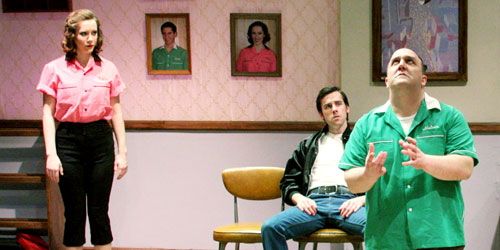
Williamston Theatre presents the warm and touching "While We Were Bowling" through April 17. Photo: Chris Purchis
Back in my early teens, my family and my sister's soon-to-be in-laws did what legions of working class families enjoyed on a Friday night: We went bowling. Although I haven't picked up a bowling ball since, what I fondly recall of those long-ago days was the camaraderie we shared as we laughed and struggled each week to see which team ended the night with the highest score. But unlike the McGlaughlin family in Williamston Theatre's "While We Were Bowling," the Calamias were lousy bowlers, and we never had dreams of winning a championship title.
Nor were we haunted by the specter of a much-beloved, yet equally despised family elder whose legendary bowling score terrorized every moment of our lives.
The McGlaughlin family's story unfolds mostly in the late 1950s, a period when the TV show "Leave It To Beaver" helped define the "typical" American family. But the Cleavers they're not. Sure, Frances (Suzi Regan) is a stay-at-home mom and irons the laundry in a dress just like June Cleaver used to do. But unlike her counterpart, Frances has a drinking problem. And yes, siblings Lydia (Kelly Studnicki) and Brent (Tyler VanCamp) fight like cats and dogs, but unlike Beaver and Wally, these two share their secrets by speaking fluent Russian – a language their father, Melvin (Joseph Albright), urged them to learn in the (unlikely) event the commies invade the McGlaughlin household.
Plus, there's one more significant difference: The Cleavers never had a 12-year-old black kid living with them.
So yes, life in Buffalo does not match up with what was depicted every week in the fictional town of Mayfield. Rather, it's far more scandalous!
Melvin, you see, has been terrorized by the number 808 for most of his adult life – which was the championship bowling score attained by his now-deceased father. In fact, 808 invades pretty much every aspect of the family's life – from address numbers to phone numbers (which was a technological impossibility in the 1950s, but I'll let that mistake slide). So Melvin and his offspring follow in the family tradition and shoot to become championship bowlers themselves – all with the goal of exorcising 808 from their lives forever.
There's trouble brewing off the lanes, however: Frances tosses down drinks rather than a bowling ball; Lydia has taken up with greaser boyfriend, Stickpin (Edward O'Ryan); and the overly religious Brent harbors what he believes is a terrible secret. Meanwhile, after delivering a new TV to the McGlaughlin house, Jeremy (Ayo Obayan) is abandoned by his brother and taken in by Frances – an act of kindness that might also be illegal.
And just when you think it couldn't get worse? It does.
As dark as this might seem, playwright Carter W. Lewis has actually crafted a sweet and poignant tale that explores the dynamics of a loving family pulled apart by tragedy and circumstance – and the effort it takes to survive what real-life has tossed their way. But what's more, Lewis has painted a much broader picture – one of a society struggling with itself as a new era of change is in the wind. A new world is dawning, and the conservative Catholic McGlaughlin family is at its epicenter.
Their story is lovingly rendered by director John Lepard, who has staged a fine and engaging production with a mix of familiar pros and up-and-coming talent from Michigan State University's Department of Theatre. Where that line is drawn is hard to distinguish.
The pros, Albright and Regan, wear their characters like a new pair of bowling gloves; each is tight and a perfect fit. Nothing less is expected from these always fine actors. And nothing more needs to be said of their excellent work.
The joy, though, is discovering the remaining members of the ensemble for the first time.
Studnicki, whose Lydia serves as the show's narrator, nicely walks the fine line between adolescent and adult: One minute she's bickering with her brother, and the next she's an adult with an adult perspective on her life. VanCamp generates plenty of laughs as the way-too Catholic son who is keeping a big secret he's too ashamed to share with his conservative parents. And O'Ryan has plenty of fun playing with the stereotype of the 1950's greaser, whose reputation is far worse than his reality.
Obayan, however, has the most difficult assignment of the MSU students – and he nails it! An adult playing a 12 year old is rarely convincing, but Obayan's body language and facial expressions work wonders. And his line delivery – often accompanied by wide-eyed innocence and total sincerity – sparkles. (A few times, though, I lost some of words because of the speed in which they were delivered.) He is, without a doubt, one of the highlights of the show.
The set by Kirk Domer, associate chair and head of design for the MSU Department of Theatre, is thoroughly functional and a creative use of Williamston's tight space. Lights by M.F.A. student B. Emil Boulos were generally fine, although there were a few instances when either the design or the execution seemed awkward.
So whether you're a fan of the sport or not doesn't matter. A drive to Williamston for "While We Were Bowling" is well worth the trip!
REVIEW:
'While We Were Bowling'
Williamston Theatre, 122 S. Putnam St., Williamston. Thursday-Sunday through April 17. $18-$24. 517-655-7469. http://www.williamstontheatre.org











